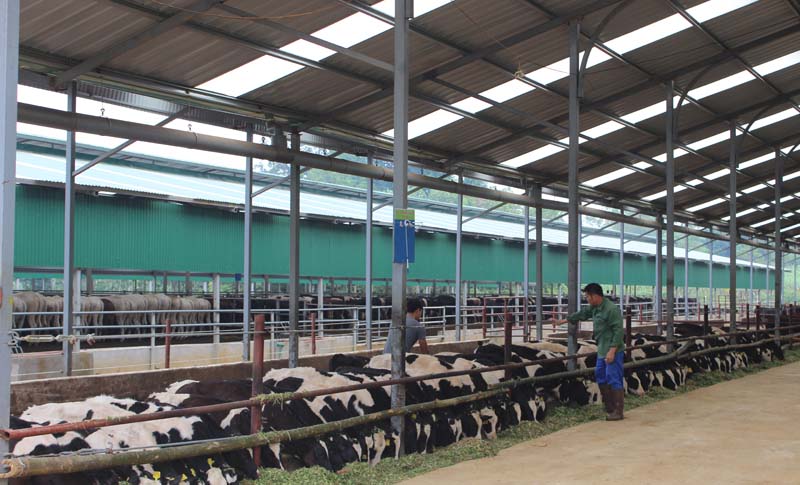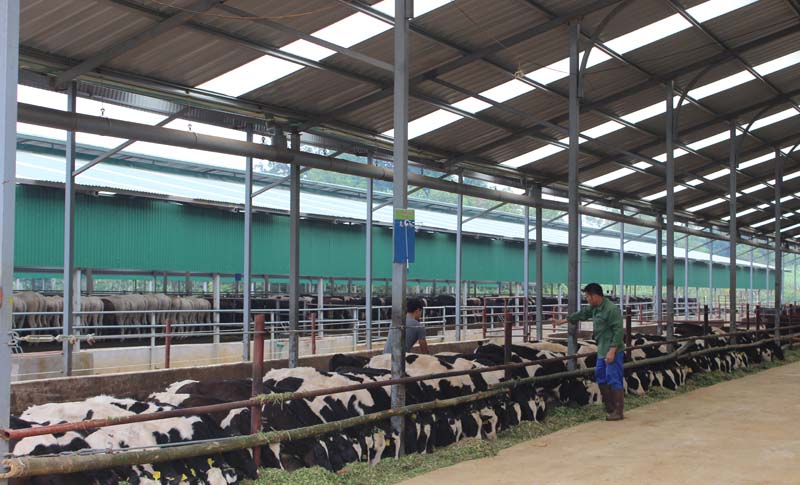
HBO – As of the end of 2017, Hoa Binh counted 55 investment projects in agriculture and rural areas with combined capital of more than 14.5 trillion VND, accounting for 11.2 percent of the total investment projects in the province. The surge in number of firms investing in agriculture and rural development after many years is a positive sign in the province’s economic situation.

An investment project building a
farm at the core of a regional linkage to raise breeding cows is carried out in
Tan My commune, Lac Son district
Hoa Binh has many favourable conditions for agricultural
production, particularly in the cultivation of fruit trees and the raising of
cattle and poultry. During 2008-2017, out of 2,587 firms and investors granted
business licences, 174 were involved in agriculture and rural development, or
6.7 percent of the total.
The increase in number of firms choosing to operate in agriculture
is attributable to the implementation of State policy, which won approval of
the business community. Since 2008, the provincial People’s Committee has
licensed 47 investment projects in agriculture and rural development, using a
total 27,000 ha of land and more than 5 trillion VND.
Projects in agriculture and rural development are mostly farms
raising cattle/poultry and fish, and planting forests, clean vegetable/fruits
and medicinal herb. Some examples are the pig raising farm using bio-technology
in Lac Thuy, the farm combining high-yield chicken raising and fruit tree and
medicinal herb planting in Yen Thuy, the farm and a regional linkage to raise
breeding cows in Lac Son, and the forest planting project during 2012-2020 by
the Hoa Binh Forestry One Member Ltd Co.
According to statistics, firms operating in agriculture and rural
areas have an average annual income of 1.6 billion VND, and their workers have
an average monthly salary of 4 million VND. They have created jobs for more
than 9,000 local workers, and contributed more than 45 billion VND a year to
the State budget./.
According to data from the Hoa Binh Provincial Party Committee, the industrial production index for the first six months of 2025 is estimated to have increased by 20% compared to the same period last year. This marks the highest year-on-year growth rate for this period since 2020.
In the first six months of 2025, Hoa Binh province’s export turnover was estimated at 1.145 billion USD, marking an 18.11% increase compared to the same period in 2024. Import turnover was estimated at $ 804 million, a 17.15% increase, which helped the province maintain a positive trade balance.
The lives of the ethnic minority farmers in Tan Lac district have gradually improved thanks to the new directions in agricultural production. This is a testament to the collective strength fostered through the professional associations and groups implemented by various levels of the district’s Farmers’ Union.
With the motto the "product quality comes first,” after nearly one year of establishment and operation, Muong village’s Clean Food Agricultural and Commercial Cooperative, located in Cau Hamlet, Hung Son Commune (Kim Boi district), has launched reputable, high-quality agricultural products to the market that are well-received by consumers. The products such as Muong village’s pork sausage, salt-cured chicken, and salt-cured pork hocks have gradually carved out a place in the market and they are on the path to obtaining the OCOP certification.
In the past, the phrase "bumper harvest, rock-bottom prices" was a familiar refrain for Vietnamese farmers engaged in fragmented, small-scale agriculture. But today, a new spirit is emerging across rural areas of Hoa Binh province - one of collaboration, organisation, and collective economic models that provide a stable foundation for production.
Maintaining growing area codes and packing facility codes in accordance with regulations is a mandatory requirement for agricultural products to be eligible for export. Recently, the Department of Agriculture and Environment of Hoa Binh province has intensified technical supervision of designated farming areas and packing facilities to safeguard the "green passport" that enables its products to access international markets.



